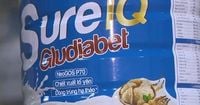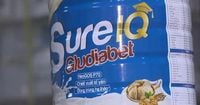In a significant development, the HIUP milk company, which has been previously advertised by notable figures such as BTV Quang Minh and Vân Hugo, officially addressed the recent controversies surrounding counterfeit milk products on April 15, 2025. The controversy erupted following the Ministry of Public Security's successful crackdown on a large-scale counterfeit milk production and distribution operation, which involved 573 different brands.
Amidst growing public concern, Alama Vietnam Business and Technology Co., Ltd., the entity responsible for the distribution of HIUP products, issued an apology to its customers and partners for the anxiety caused by the misinformation circulating online. In their statement, Alama asserted that they have no connection to the counterfeit milk production network that has garnered significant media attention.
Alama's official statement highlighted the detrimental impact of false information, stating, "Recently, regarding the incident where authorities discovered and dealt with nearly 600 types of counterfeit milk powder on the market, Alama has noticed some individuals and organizations exploiting the situation to disseminate misleading information, distorting the nature of the case. Such actions not only directly harm the brand's reputation but also undermine the trust of customers and partners, causing damage to the legitimate business operations and honor of the enterprise."
The company emphasized its commitment to quality, reassuring consumers that all products, including HIUP, meet regulatory quality standards and food safety regulations. Alama confirmed that every product undergoes regular inspections by competent authorities to ensure compliance with technical requirements and published standards.
Vân Hugo, a well-known MC and actress, also found herself in the spotlight following the scandal, as her previous advertisements for HIUP milk were recalled by social media users. On the same day, she shared the latest announcement from the milk brand she once endorsed, which clarified that their products are periodically tested and licensed by authorities, asserting no connection to the two companies currently under investigation for producing fake milk.
The brand reiterated its disassociation from the case involving nearly 600 types of counterfeit milk powder. Vân Hugo's involvement in the advertising campaign came under scrutiny, especially since the product she promoted faced penalties in March 2024 for advertising that did not comply with regulations. The brand took proactive measures by ceasing the use of non-standardized content and removing any violating materials from their advertising.
Meanwhile, the Vietnam Dairy Association has formally requested the Ministry of Public Security, the Ministry of Health, the Ministry of Industry and Trade, and the Ministry of Agriculture and Rural Development to enhance the prevention of counterfeit milk products. In their letter, they highlighted the alarming rise in the production and sale of fake and substandard milk products, which pose serious health risks to consumers, particularly vulnerable groups such as children, pregnant women, the elderly, and individuals with underlying health conditions.
The association expressed gratitude to the Ministry of Public Security for its ongoing investigations and prosecutions of counterfeit milk production cases. Recently, the Ministry prosecuted two major companies, Hacofood Group and Rance Pharma, which were found to be involved in the production of counterfeit milk products valued at hundreds of billions of VND. Notably, these companies are not members of the Vietnam Dairy Association.
Fake milk products have been reported to lack essential ingredients, with many being marketed as containing premium components like bird's nest extract and cordyceps. However, investigations revealed that these products did not contain the advertised ingredients and fell below 70% of the declared quality standards.
In a broader context, the Vietnam Dairy Association highlighted the severe implications of counterfeit milk production on public health. They noted that substandard milk products could severely affect the physical and intellectual development of children and lead to long-term health issues for individuals with pre-existing conditions. The association urged relevant authorities to intensify their efforts in managing, inspecting, and prosecuting those involved in the production and sale of counterfeit milk products.
As the situation develops, the public remains on high alert, with many expressing outrage over the potential health risks associated with counterfeit milk. The Ministry of Public Security has already initiated legal actions against several individuals involved in the counterfeit milk operation, including Vu Manh Cuong and Hoang Manh Ha, among others. The ongoing investigations aim to dismantle the networks responsible for this alarming trend in the dairy industry.
The public's trust in the dairy market is at stake, and the repercussions of this scandal could have lasting effects on both consumers and legitimate dairy producers. As authorities continue to crack down on counterfeit operations, the hope is to restore confidence in the safety and quality of dairy products available in Vietnam.




